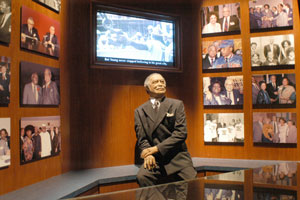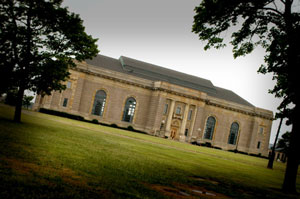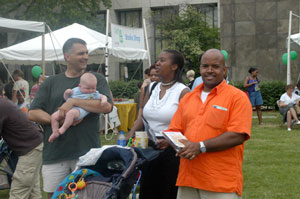Let’s Move Past Race
Economic-development experts seem to agree: racial fighting blocks development. Diversity, on the other hand, can help spur it, says Keith Schneider, deputy director of the Michigan Land Use Institute.
The scene is familiar. A group of developers sits before Detroit City Council. They’re explaining a project hoped to inject economic verve into an investment-starved corridor.
On this particular day the developers on hand chart plans for an upscale shopping center on Woodward Avenue near Eight Mile. Neighbors at the meeting express glee at the prospect.
Then the conversation turns to race. Councilman Alonzo Bates raises questions about black participation in the project. Unlike many forced to squirm when such questions come up, construction manager J.L. Dumas has an answer.
“The last time I looked in the mirror, I was black,” Dumas deadpans.
“I have a track record,” Dumas says later of the discussion. “I didn’t understand what the issue was.”
The builder’s Detroit-based Dumas Concepts is the sole construction company for the shopping mall project. Dumas says one-third of the development team is minority. But that shouldn’t be an issue, he says.
“The secret in growing Detroit is to move past racial issues and focus on business development,” Dumas says. “We’ve got to be in a welcoming environment.”
Back at City Council table, the transition from race to development is awkward. Unfortunately, race is not an unusual conversation here.
 When contracts are up for discussion in front of City Council, skin color can become a major issue. When council members don’t vote the way some vocal grassroots organizations prefer, the groups issue derogatory SAMBO awards. Racial animosities were stoked last year when the council sought to create an African Town business district. The plan inflamed non-black immigrant communities and many others in the metro area. The City Council also adopted an ordinance that requires businesses seeking city contracts to disclose whether they benefited financially from slavery.
When contracts are up for discussion in front of City Council, skin color can become a major issue. When council members don’t vote the way some vocal grassroots organizations prefer, the groups issue derogatory SAMBO awards. Racial animosities were stoked last year when the council sought to create an African Town business district. The plan inflamed non-black immigrant communities and many others in the metro area. The City Council also adopted an ordinance that requires businesses seeking city contracts to disclose whether they benefited financially from slavery.
Clearly, race is front and center at the council table.
 But Detroit isn’t the only place playing the race card. Racially-coded remarks snake into political literature and commentary in the suburbs and rural Michigan on a regular basis. Last November, Democrat Dave Woodward challenged incumbent Republican Pete Webster for a spot on the Oakland County Commission. Webster’s campaign material boldly criticized Rep. Woodward for sending tax dollars to Detroit and not “reforming” the Detroit water board. Such arguments are considered by Detroiters as racist.
But Detroit isn’t the only place playing the race card. Racially-coded remarks snake into political literature and commentary in the suburbs and rural Michigan on a regular basis. Last November, Democrat Dave Woodward challenged incumbent Republican Pete Webster for a spot on the Oakland County Commission. Webster’s campaign material boldly criticized Rep. Woodward for sending tax dollars to Detroit and not “reforming” the Detroit water board. Such arguments are considered by Detroiters as racist.
The race obsession hurts the metropolitan area as it grapples with economic vitality, repopulation and fiscal stability.
“If you antagonize corporations, what they’re going to do is leave because there are tons of places just dying for business to come in. And if you antagonize business, how are you helping? Detroit has to worry about unemployment, providing services and they cannot do it without a tax base,” said David Bositis, senior policy analyst in Washington, D.C. for the Joint Center for Political and Economic Studies, a black think-tank.
Economic-development experts seem to agree: racial fighting blocks development. Diversity, on the other hand, can help spur it, says Keith Schneider, deputy director of the Michigan Land Use Institute.
According to Schneider’s institute, metropolitan Detroit is an example of what happens when people can’t get along. The seven-county region is home to 4.8 million people, just 100,000 more than in 1970. The nonprofit think tank says metro Detroit is the slowest growing of any of the nation’s 10 largest metropolitan regions—not to mention the most economically and racially segregated.
Meanwhile, the fastest-growing area of the city is southwest Detroit, an area featuring Hispanic, black and white residents. And while the city’s historical racial problems run deep, there are movements toward change.
Detroit Synergy, a multiracial nonprofit city booster of 20- and 30-something city and suburban dwellers, is engaging in dialogues hoped to break down racial and social barriers. Groups like CreateDetroit are forming coalitions to promote the best of the city and attract new residents.
Some of those coming into the city hope that it can get over the race issue. Rev. Phill Jackson leads the multiracial Christ Church parish in downtown Detroit. He relocated to the city six years ago, and says he quickly learned that many city residents incorrectly morph issues into white vs. black, city vs. suburb.
“My observation here is that race is used, but race really isn’t the issue. It’s money. How else do you explain the fastest leaving group in the 2000 census is the black middle class? How do you explain that if it’s all about race?” Jackson says.
Age plays a role. There’s a disconnect between those who matured during Vietnam and the Civil Rights Movement and the younger generation, says Michael Tenbusch, 35, the former head of a Detroit youth sports nonprofit.
 “People over 45 have trouble understanding that those of us under 45 don’t see issues through the lens of race. Very talented people, blacks and whites, leave [Detroit rather] than continue to fight a battle that’s 30 years old,” says Tenbusch.
“People over 45 have trouble understanding that those of us under 45 don’t see issues through the lens of race. Very talented people, blacks and whites, leave [Detroit rather] than continue to fight a battle that’s 30 years old,” says Tenbusch.
Born in the 1970s, Mayor Kwame Kilpatrick personifies Generation X. Kilpatrick has said that Detroit’s obsession with race keeps it from becoming a diverse cosmopolitan center.
“In a city like Detroit, with a storied race history, there has to be some sensitivity to race when affecting public policy,” the 35-year-old mayor says.
He adds that for the younger generation, the issues are different.
“Equality for us is economic, not purely social. That is what distracts us from moving forward. Sometimes we’re overly concerned with social issues and that’s where policy suffers,” Kilpatrick says.
The Detroit region can look to Atlanta, New York, San Francisco, London and Paris as places where integration, diversity and regionalism have spurred economic development. If Detroit –and the metro area — wants to compete and rank among cosmopolitan cities, it will have to reassess the existing racial paradigm.




